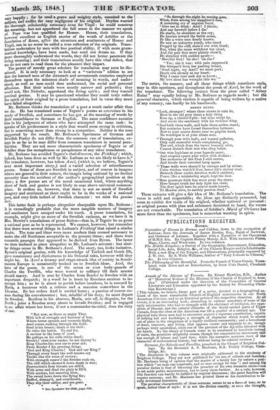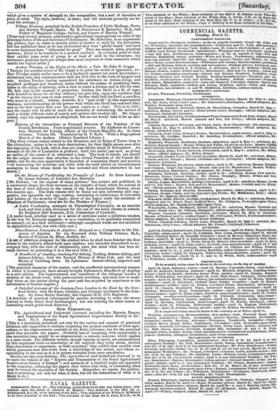PUBLICATIONS RECEIVED.
Boosts.
Narrative of Events in Borneo and Celebes, down to the occupation of Labuan; from the Journals of James Brooke, Es*, Rajah of Sarawak, and Governor of Labuan. Together with a Narrative of the Operations of EMS. Iris. By Captain Rodney Mundy, R.N. With numerous Plates, Maps, Charts, and Wood-cats. In two volumes. The Middle Kingdom; a Survey of the Geography, Government, Education, Social Life, Arts, Religion, &c., of the Chinese Empire and its Inhabitants. With a new Map of the Empire, and Illustrations, principally engraved by J. W. Orr. By S. Wells Williams, Author of " Easy Lessons in Chinese," &c. In two volumes. The Philosophy of the Beautiful. From the French of Victor Cousin. Trans- lated, with Notes and an Introduction, by Jesse Cato Daniel, Cheshunt College.
Annals of the Diocese of Toronto. By Ernest Hawkins, B.D., Author of " Historical Notices of the Missions of the Church of England in Ame- rica." (Published under the direction of the Committee of General Literature and Education appointed by the Society for Promoting Chris- tian Knowledge.) [This volume, we believe, forms part of a series, devoted to a biographical ac- count of the most remarkable Church-of-England missionaries in our North American Colonies, and to an historical precis of the respective churches. At all events, it is an interesting book; abounding in curious anecdotes of some of the early missionaries, who had to struggle with the obstinacy of irreligion, the oppo- sition of Dissent, and the natural obstacles of the thinly-settled parts of Upper Canada, from the close of the American war till a quarter of a century ago. The physical toils those men had to encounter argued a vigorous constitution, capable of defying toil and hardships; a strength of character which would be almost out of place in the clergyman of a highly civilized community; and a homeliness of dress, manners, and living, that appears coarse and ungainly to us, though perhaps truly apostolical, since one of the greatest of the Apostles laboured with his hands. As the clergy of Canada come to be numbered by hundreds instead of units, the primitive simplicity ceases, though the conscientious missionary still has enough of labour and hard fare; while the narrative assumes more of the character of ecclesiastical history, but without losing its colonial raciness.] Sermons for Schools and Families, preached in the Chapel of Brighton Col- lege. By the Reverend A. J. Macleane, B.A. Trinity College, Cam-
bridge, &c.
[The discourses in this volume were originally addressed to the students of Brighton College. They are now published for the use of schools and families; Mr. Macleane being of opinion that the master of a family has by nature a posi- tion which "no man can supersede, and no man occup' for him "; and among his peculiar duties is that of becoming the preacher of his own domestic circle—not to set aside public ministrations, but to carry them further. As a rule, however, this function can hardly be fulfilled by original discourses; the pater families will require sermons; and Mr. Maclean has printed these as his contribution to fa- mily devotional literature. The peculiar characteristic of these sermons seems to us a force of tone, so to speak, rather than of style: it is not the diction exactly, or even the thought, which gives a species of strength to the composition, but a sort of elevation or pitch of mind. The style, however, is close; and the sermons generally are be- yond the average.] Village Sermons, preached in the Parish Churches of Little Hadham, Herta,
and Hartley Wes*1, Hants. By R. Drummond B. Rawnsley, M.A., late Fellow of Magdalen College, Oxford, and Curate of Hartley Weapon. [Four-and-twenty sermons, addressed to egncultural congregations on some of the principal duties of life and doctrines of Christianity. Mr. Rawnsley, in an unpretend- ing preface, lays no claim to novelty either of matter or style for his discourses, but has published them as he has understood they were "gladly heard," and have in some instances been " influential for good." They are earnest, plain, practical sermons, likely to be beneficial to a general audience. In a literary point of view, they exhibit some want of grasp, or at least of skill in the structure: the successive positions have not always that exact sequence or close connexion which marks the logical artist.]
Arthur Treviso:, or the Night of the Mind; a Tale. By John B. Goggs. [Though the avowed object of Mr. Goggs is to point the moral of ignorance, Ar- thur Trevlyn might rather seem to be a landmark against too much knowledge- alchemical arts, and communication with the Evil One in the form of bargain and sale. Arthur Trevlyn having. squandered his substance on riotous living, and acquired profligate and luxurious tastes without the means of gratifying them, takes to the study of alchemy, with a view to make a fortune and to live for ever. He fails just in the moment of projection; invokes the Devil in a fit of rage; sells himself to Satan for all that alchemy can give him, upon the condition that "on the twenty-first year of each century" Arthur shall find the Devil a sacrifice, Who must be a female. Arthur, however, is a "poor stick" at this supernatural business, notwithstanding all the powers with which the Devil has endowed him; and on the first twenty-first year his career comes to a close. This is in 1821: and the reader will be able to mark the absurdity of introducing the notions of such a widely different state of society and opinion into modern life. Mr. Goggs, indeed, says the supernatural is allegorical; but no one would take it for an alle- gory.] History of the Girondists; or Personal Memoirs of the Patriots of the
French Revolution. From unpublished sources. By Alphonse de Lamar- tine, Minister for Foreign Affairs of the French Republic, Sec. In three volumes. Volume ILL Translated by H. T. Hyde. With a Biographical Sketch of the Author. (Bohn's Standard Library.) [The third volume rather relates to the Mountain and its Reign of Terror than to the Girondists, unless it be to their destruction; for their flight occurs soon after the beginning of the book, which does not close till the death of Robespierre. An account of the life of Lamartine is prefixed; brief, but useful just now, as giving an outline of the career of so celebrated a man. The book is timely, not merely for the vulgar interest that attaches to the virtual President of the French Re- public, but for the rare opportunity it furnishes of comparing theory and practice -of contrasting the historian and critic with the ruler placed in circumstances analogous to those whose deeds he has narrated and whose characters he has drawn.]
On the Means of Facilitating the Transfer of Land. In three Lectures. By James Stewart, of Lincoln's Inn, Barrister.
[Mr. Stewart, "at the request of many persons," has revised and published in a convenient shape, his three lectures on the transfer of land, which we noticed at the time of their delivery in the rooms of the Law Amendment Society, about two months ago. The little volume will be found not only informing and sug- gestive, but agreeable and easy reading; interesting to landowners, to borrowers and lenders on the security of lands: many of the topics merit the attention of Members of Parliament; some are for the Minister of Fitiance.]
Latin Vocabulary, arranged on Etymological Principles, as an exercise book arid first Latin dictionary for the use of the lower classes in schools. By Benjamin Hall Kennedy, D.D., Prebendary of Lichfield.
[A useful book, whether used as a series of exercises under a judicious teacher, in the way Dr. Kennedy suggests; or as a vocabulary, to be gradually committed to memory; or as a first dictionary,-although compound words are not exhibited in alphabetical order, but with their root.]
Miscellaneous Examples in Algebra; designed as a Companion to the Ele- ments of Algebra. By the Reverend John William Colenso, MA., Rector of Forncett St. Mary, Norfolk, &e. [AM of exercises designed for the student when he shall have finished the first course in the author's school-book upon algebra; and intended thenceforth to ac- company him, with the view of reimpressing upon the mind what has been al- ready learned, by presenting it in a less easy form.] A Handbook of Angling; teaching Fly-fishing, Trolling, Bottom-fishing, and Salmon-fishing; with the Natural History of River Fish, and the best Modes of Catching them. By Ephemera. Second edition, improved and extended. rThe practical character of the matter, and the unaffected conversational manner in which it is conveyed, have already brought Ephemera's Handbook of Angling i to a new edition. The improvements and extensions of the titiepage involve a revision of the whole work, with parts entirely rewritten, and such new or modi- fied views as the author during the past year has acquired by experience or the information of brother anglers.] A Detaikd Account of the Journey from London to the East by the Over- land Route; with the Fares, Charges, and Changes incidental to the Jour-
ney. By Jones Butler Staveley, late Captain H.M. 37th Regiment. [A brochure of practical information for persons intending to make the steam journey to India direct from Southampton, but not noticing the other routes or containing much guide-book direction.]
NEW PERIODICAL.
The Agricultural and Industrial Journal; including the Reports, Essays, and Transactions of the Royal Agricultural Improvement Society of Ire- land. No. I. January.
[This is a promising periodical, not only for the variety and amount of practical criticism and suggestion it contains respecting the present condition of Irish avi- culture or the improvements available to the Irish cultivator, but for the practical spirit that pervades the papers. Probably less of reasoning, with occasionally a less oratorical tone, might be an improvement; a remark, however, which applies to a mere mode. The different writers, though varying in merit, are characterized by this important trait-a knowledge of the subjects they write about, derived from observation or experience, or both conjoined: they exhibit that sensible view which possesses men who write from a knowledge of the actual, and whose re- sponsibility to the real as it is in nature restrains from mere speculation.
Besides its own contributions, The Agricultural and Industrial Journal is to
be made the vehicle of the " Reports and Transactions of the Royal Agricultural Improvement Society of Ireland "; and upwards of a hundred pages are appended to the magazine, embracing the papers read before that body, or containing what may be termed the statistics of the Society. Altogether we repeat, the publica- tion is promising, not only for what it does, but for the indications of what it is likely to do.]



























 Previous page
Previous page